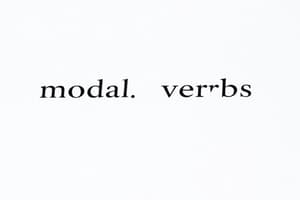Podcast
Questions and Answers
Which modal verb is correctly used to express necessity in the sentence: 'You _____ wear a helmet while riding a bike.'?
Which modal verb is correctly used to express necessity in the sentence: 'You _____ wear a helmet while riding a bike.'?
- can
- may
- should (correct)
- might
What type of conditional statement is represented by this example: 'If it rains, I will stay home.'?
What type of conditional statement is represented by this example: 'If it rains, I will stay home.'?
- Zero Conditional
- First Conditional (correct)
- Third Conditional
- Second Conditional
In what scenario would you use the modal verb 'could'?
In what scenario would you use the modal verb 'could'?
- To suggest an immediate action.
- To indicate a past ability. (correct)
- To express a strong necessity.
- To propose permission.
Which of the following is a characteristic of a formal communicative style?
Which of the following is a characteristic of a formal communicative style?
Identify the correct example of a Second Conditional statement.
Identify the correct example of a Second Conditional statement.
Which modal verb conveys a polite request in this sentence: '_____ you help me with my homework?'
Which modal verb conveys a polite request in this sentence: '_____ you help me with my homework?'
What is the primary feature of passive communicative style?
What is the primary feature of passive communicative style?
Which of the following describes the Zero Conditional?
Which of the following describes the Zero Conditional?
Flashcards are hidden until you start studying
Study Notes
MODAL VERBS
- Definition: Auxiliary verbs that express necessity, possibility, permission, or ability.
- Common Modal Verbs:
- Can: ability or possibility (e.g., She can swim.)
- Could: past ability or polite request (e.g., Could you help me?)
- May: permission or possibility (e.g., You may leave early.)
- Might: a weaker possibility (e.g., It might rain later.)
- Must: necessity or strong recommendation (e.g., You must wear a seatbelt.)
- Shall: formal suggestion or future action (e.g., Shall we dance?)
- Should: advice or recommendation (e.g., You should see a doctor.)
- Will: future intention (e.g., I will call you tomorrow.)
- Would: polite request or hypothetical situation (e.g., I would help if I could.)
- Usage:
- Expressing obligation: "You must finish your homework."
- Making requests: "Could you pass the salt?"
- Offering suggestions: "You should try the new restaurant."
- Indicating future action: "I will join you later."
CONDITIONAL STATEMENTS
- Definition: Sentences expressing "if-then" scenarios; often used to discuss potential outcomes.
- Types of Conditionals:
- Zero Conditional: General truths (if + present simple, present simple)
- Example: If you heat ice, it melts.
- First Conditional: Real future possibilities (if + present simple, will + base verb)
- Example: If it rains, I will stay home.
- Second Conditional: Hypothetical present situations (if + past simple, would + base verb)
- Example: If I had a million dollars, I would travel the world.
- Third Conditional: Hypothetical past situations (if + past perfect, would have + past participle)
- Example: If I had known, I would have called you.
- Zero Conditional: General truths (if + present simple, present simple)
- Usage:
- To express real and imagined situations.
- To discuss cause and effect relationships.
COMMUNICATIVE STYLE
- Definition: The manner in which one conveys messages, reflecting personality and intent.
- Types of Communicative Styles:
- Formal: Used in professional or academic contexts; follows standard grammar and vocabulary.
- Example: "I am writing to request information regarding..."
- Informal: Casual and familiar; may include slang or colloquialisms.
- Example: "Hey, can you send me that info?"
- Assertive: Clear and confident expression of thoughts and needs.
- Example: "I believe we should consider alternative solutions."
- Passive: Indirect expression; may avoid direct confrontation.
- Example: "It seems that there was a misunderstanding."
- Persuasive: Aimed at convincing others.
- Example: "I urge you to consider the benefits of this proposal."
- Formal: Used in professional or academic contexts; follows standard grammar and vocabulary.
- Factors Influencing Style:
- Audience: Tailoring language and formality to the listener.
- Purpose: Determining the intent of communication (informing, persuading, etc.).
- Context: Adjusting to social or cultural norms.
MODAL VERBS
- Auxiliary verbs that express necessity, possibility, permission, or ability.
- Common Modal Verbs:
- Can: Indicates ability or possibility (e.g., "She can swim.").
- Could: Refers to past ability or makes polite requests (e.g., "Could you help me?").
- May: Signifies permission or possibility (e.g., "You may leave early.").
- Might: Suggests a weaker possibility (e.g., "It might rain later.").
- Must: Conveys necessity or a strong recommendation (e.g., "You must wear a seatbelt.").
- Shall: Used for formal suggestions or future actions (e.g., "Shall we dance?").
- Should: Offers advice or recommendations (e.g., "You should see a doctor.").
- Will: Indicates future intention (e.g., "I will call you tomorrow.").
- Would: Expresses polite requests or hypothetical situations (e.g., "I would help if I could.").
- Usage:
- Obligation expressed through "must": "You must finish your homework."
- Requests formed with "could": "Could you pass the salt?"
- Suggestions given using "should": "You should try the new restaurant."
- Future actions indicated with "will": "I will join you later."
CONDITIONAL STATEMENTS
- Sentences structured to express "if-then" scenarios, useful for discussing potential outcomes.
- Types of Conditionals:
- Zero Conditional: States general truths (if + present simple, present simple). Example: "If you heat ice, it melts."
- First Conditional: Deals with real future possibilities (if + present simple, will + base verb). Example: "If it rains, I will stay home."
- Second Conditional: Explores hypothetical present situations (if + past simple, would + base verb). Example: "If I had a million dollars, I would travel the world."
- Third Conditional: Focuses on hypothetical past situations (if + past perfect, would have + past participle). Example: "If I had known, I would have called you."
- Usage:
- Useful for expressing actual and imagined situations.
- Employed to discuss cause and effect relationships.
COMMUNICATIVE STYLE
- Refers to the manner of conveying messages, reflecting one’s personality and intent.
- Types of Communicative Styles:
- Formal: Utilized in professional or academic contexts; adheres to standard grammar and vocabulary. Example: "I am writing to request information regarding..."
- Informal: Casual and familiar language; incorporates slang and colloquialisms. Example: "Hey, can you send me that info?"
- Assertive: Clear and confident expression of thoughts and needs. Example: "I believe we should consider alternative solutions."
- Passive: Indirect expression that may evade direct confrontation. Example: "It seems that there was a misunderstanding."
- Persuasive: Aimed at convincing others. Example: "I urge you to consider the benefits of this proposal."
- Factors Influencing Style:
- Audience: Adjusting language and formality to match the listener.
- Purpose: Determining intent behind communication, whether to inform or persuade.
- Context: Tailoring style to fit social or cultural norms.
Studying That Suits You
Use AI to generate personalized quizzes and flashcards to suit your learning preferences.




